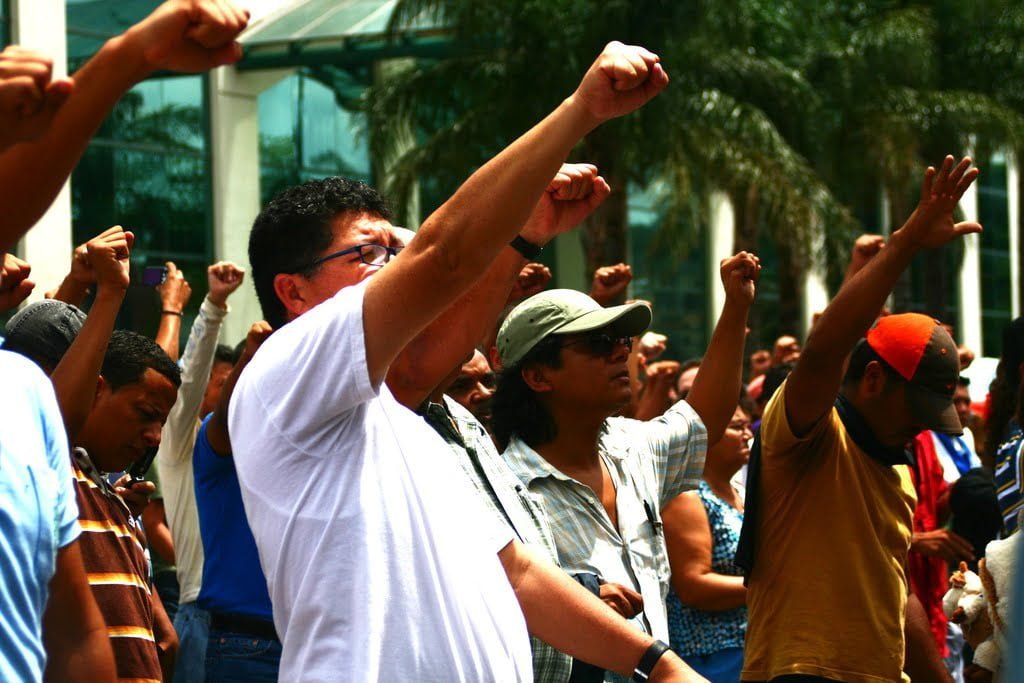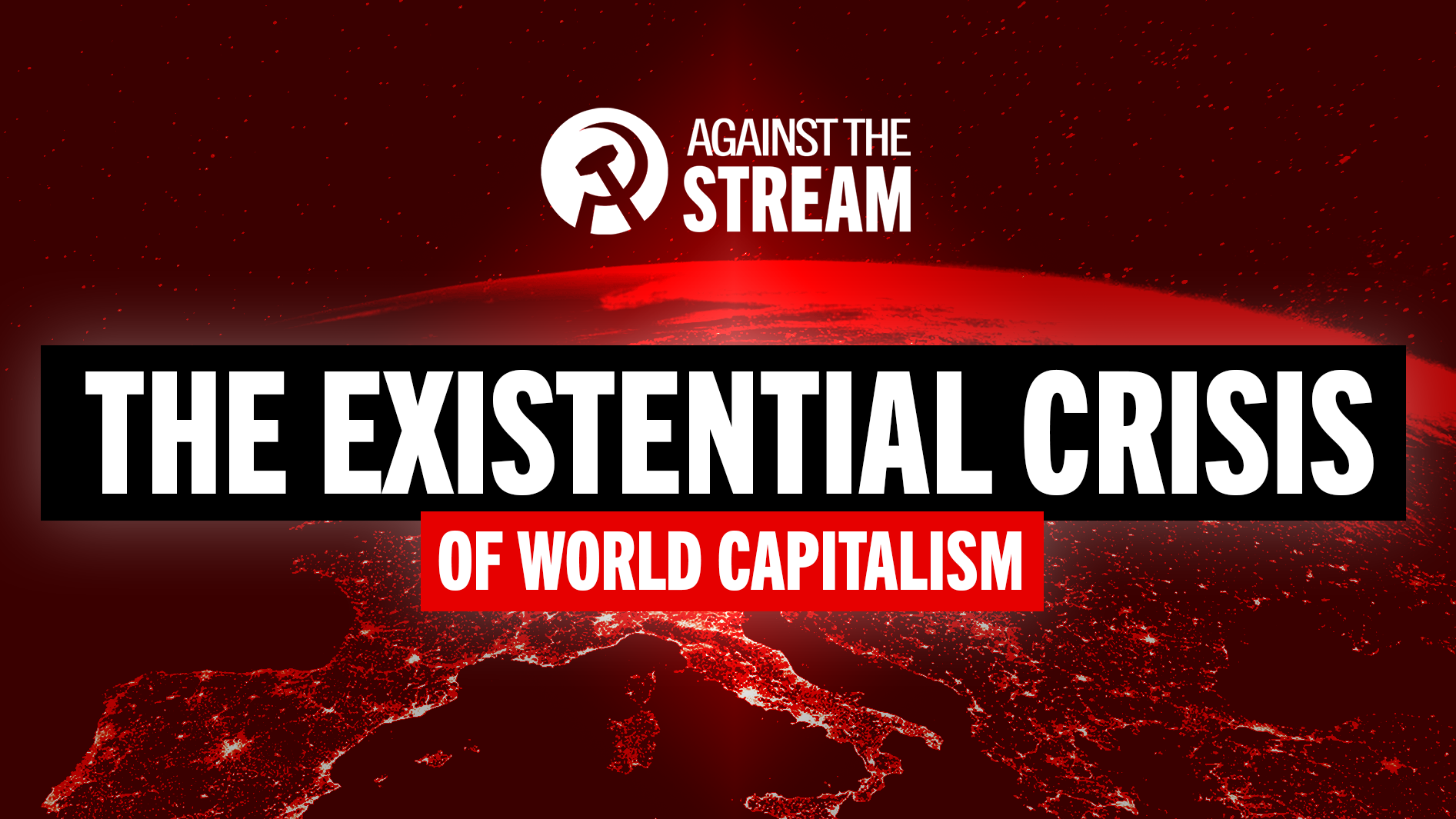All that was solid has melted into air. The ground is being prepared for a revolutionary overthrow of the old order.
We present here the third and final part of the International Marxist Tendency’s 2018 perspectives for world revolution. This constitutes the Marxists’ analysis of the current situation in world politics, and predictions about where we are headed.
This draft document will be discussed and finalised at the IMT’s 2018 World Congress, set to take place this summer. It was originally written at the beginning of this year. Although some of the events described have moved on since, these developments only further confirm our overarching assessment of the world situation.
In this final part, we look at the sharpening class struggle developing in the ex-colonial countries – particularly in Latin America and South Africa; a process that reflects the general instability of the capitalist system worldwide.
In addition, we highlight the key conclusions from our global analysis: on the one side, the ruling class is mired in pessimism about the collapse of their system; on the other, workers and youth everywhere are being radicalised by the broken status quo and are looking for an alternative. The only thing standing in the way of revolutionary change, as Trotsky noted, is the crisis of leadership.
Latin America
 The electoral debacle of Kirchner in Argentina, the defeat of the PSUV in the National Assembly elections in Venezuela, the defeat of Evo Morales in the referendum in Bolivia and the removal of Dilma in Brazil have plunged the reformists and “progressive” intellectuals on the continent into despair. They talk of a “conservative wave” and the advance of counter-revolution, without understanding any of the real processes involved.
The electoral debacle of Kirchner in Argentina, the defeat of the PSUV in the National Assembly elections in Venezuela, the defeat of Evo Morales in the referendum in Bolivia and the removal of Dilma in Brazil have plunged the reformists and “progressive” intellectuals on the continent into despair. They talk of a “conservative wave” and the advance of counter-revolution, without understanding any of the real processes involved.
For a period of 10 or 15 years, most of South America experienced a revolutionary wave, which affected different countries with different degrees of intensity. There was the election of Chavez in Venezuela in 1998 and the revolutionary events in the defeat of the coup in April 2002 and the struggle against the bosses’ lockout in December 2002-January 2003, the Argentinazo in 2001, the uprising in Ecuador in 2000 which overthrew Mahuad, then the overthrow of Lucio Gutierrez in 2005, which led to the election of Correa in 2006. In Bolivia there was the Cochabamba “water war” in 1999-2000 and then the Gas War uprisings of October 2003 and June 2005, which led to the election of Evo Morales. In Peru there was the Arequipazo uprising in the south in 2002.
One might add to these the massive movement against election fraud in Mexico in 2006 and the Oaxaca commune of the same year, the huge and sustained movement of the Chilean students, the mass mobilisations in Honduras against the coup in 2009, even the election of Lula in Brazil in 2002, although of course not a revolutionary event in itself, all reflecting the yearning of the masses for fundamental change.
As a by-product of these huge movements of the workers (and in some countries the peasant masses) a number of governments came to power that were generally described as “progressive” or “revolutionary”. Clearly they were different one from the other. While for instance Chavez, in a confused way, groped for and was pushed towards revolutionary change, Evo Morales, Correa and the Kirchners in Argentina were striving to reestablishing order after the entry of the masses into the scene, while Lula and Dilma were reformists in power carrying out a programme of counter-reforms.
The Left in El Salvador has had almost no room for manoeuvre and is starting to roll back some of its modest reforms, generating disillusionment amongst the masses towards the FMLN. This mood is being capitalised, in the first instance, by the mayor of San Salvador, Nayib Bukele, who has been expelled from the party and has widespread sympathy amongst the youth.
However, all of these governments enjoyed a certain degree of stability for a prolonged period of time. This in part was the result of the strength of the movement of the masses, which the ruling class could not defeat in a direct confrontation (the coups in Venezuela 2002, Bolivia 2008 and Ecuador 2010 were defeated). Above all, they benefited from a period of high prices of raw materials and oil which allowed them to carry out some social programmes while avoiding a direct clash with the masses.
Driven by economic growth in China, prices of raw materials went up steadily between 2003 and 2010. Oil prices increased from $40 a barrel to over $100. Natural gas had been around $3/MMBtu and increased to between $8 and $18. Soybeans jumped from $4 to a peak of $17/bu. Zinc went from a low point of under $750/mt to a record high of $4,600, copper from under $0.60 per pound to $4.50 and tin from $3,700/mt to a peak of $33,000/mt.
This boom in the prices of commodities and sources of energy which gave these governments certain room for manoeuvre came to an end and brought the whole region into recession in 2014-15. This is the root economic cause for the electoral and other defeats of these governments which had always remained within the limits of capitalism.
With the rise of the Venezuelan Revolution, Cuba had a certain economic respite. This has now come to an end. The Cuban economy is still based on the planned economy, but the reforms which have been introduced have opened a bigger space for capitalist economy, allowing small businesses as well as attempting to attract large scale private investment. The aim is to increase productivity by using capitalist methods without introducing any measures of workers’ control.
Even today many of the social conquests remain, but their scope is increasingly limited and its quality worsened. There is a growing social differentiation. This is very dangerous. This year there will be elections in which for the first time the president will not be one of the Castros nor anyone from the historic leadership of the revolution. We will see clashes and pressures by the capitalist right wing, internal and foreign, but also a reaction in the opposite direction on the part of those who have not benefited from these reforms and those who want to defend the socialist revolution.
Despite the pathetic moaning of the Latin American “Left”, the removal of Kirchner in Argentina and Dilma in Brazil cannot be attributed to a “shift to the right”. The coming to power of Temer and Macri has seen massive protest movements of the working class against the open policy of attacks carried out by the right wing.
What is opening up in Latin America is not a period of social peace and capitalist stabilisation, but rather one of sharpening contradictions and increased class struggle. This has been proven with the insurrectionary movement in Honduras, after the 2017 election. Before, in Guatemala, in 2015, an inter-bourgeois conflict opened the way for a mass mobilisation of the youth, the peasant organisations and the working class. That process has not finished yet. In 2017 we saw a general strike demanding the resignation of president Jimmy Morales and 107 members of parliament.
Other countries will follow the same road, like Mexico, which will hold presidential elections this year – an event which the masses will use to express that they are sick and tired of capitalist barbarism.
Venezuela
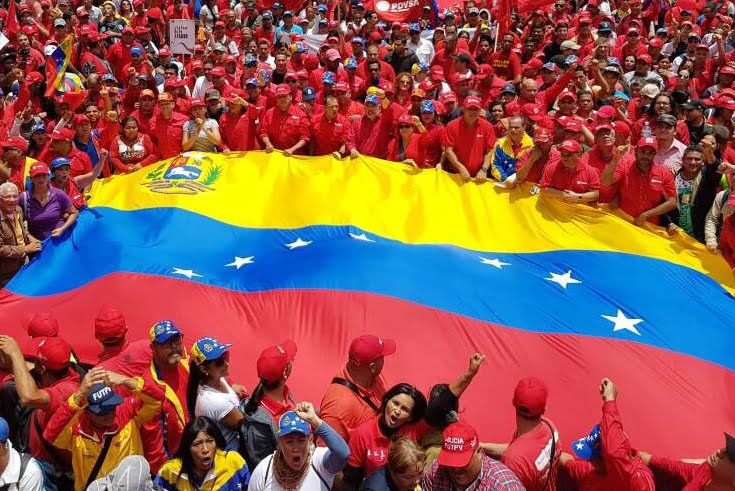 The attempt of the Venezuelan oligarchy, with the backing of imperialism, to overthrow the Maduro government seems to have been defeated for now. The mistakes and vacillations of the opposition leadership, as well as the reaction of the masses, who came out in force during the Constituent Assembly elections in July 2017, put a temporary end to the opposition’s offensive in the first half of the year. But that does not change anything fundamental in terms of the economic crisis, or the policies of the government.
The attempt of the Venezuelan oligarchy, with the backing of imperialism, to overthrow the Maduro government seems to have been defeated for now. The mistakes and vacillations of the opposition leadership, as well as the reaction of the masses, who came out in force during the Constituent Assembly elections in July 2017, put a temporary end to the opposition’s offensive in the first half of the year. But that does not change anything fundamental in terms of the economic crisis, or the policies of the government.
Venezuela remains mired in a deep recession, with hyperinflation and rapidly diminishing foreign currency reserves, and this is having a very negative impact on the living standards of the masses. Imperialism continues to tighten the noose with financial sanctions. The government continues a policy of making concessions to the capitalists and negotiating with the political representatives of the opposition. Their only aim is to remain in power.
The temporary defeat of the opposition’s offensive has opened up the window for a sharpening of the internal differentiation within the Bolivarian movement. There have been workers’ demonstrations and the emergence of left-wing candidates to rival the official ones in the municipal elections.
Our position is clear: we oppose the overthrow of the Maduro government by the opposition as that would be a disaster for the masses. At the same time we cannot support the policies of the government, which lead directly to disaster and defeat for the Bolivarian revolution.
There is a growing mood of criticism towards the Bolivarian leadership, which cannot have the same authority as Hugo Chavez. The decision of Eduardo Saman, a former minister who stood out as a champion of workers’ control and an opponent of big business and capitalist multinationals, to stand as a candidate in the municipal elections of December 2017 was a clear indication of this changed mood.
Although it was always clear that the bureaucracy was determined to sabotage Saman’s campaign, it was nevertheless a turning point that opens up new possibilities for the Marxist tendency in Venezuela.
India and Pakistan
 Narendra Modi came to power in 2014 on the basis of a widespread disillusionment with the Congress party, both by the working masses and by a layer of the bourgeoisie itself. But he has not been able to satisfy any of the forces that brought him to power. His demonetisation drive and the Goods and Services Tax reform were meant to facilitate business, but instead they have added to the weakening of the economy, which fell from above 9% growth rates to less than 7% in 2017.
Narendra Modi came to power in 2014 on the basis of a widespread disillusionment with the Congress party, both by the working masses and by a layer of the bourgeoisie itself. But he has not been able to satisfy any of the forces that brought him to power. His demonetisation drive and the Goods and Services Tax reform were meant to facilitate business, but instead they have added to the weakening of the economy, which fell from above 9% growth rates to less than 7% in 2017.
The brief period of high growth between 2014-2016 has now given way to a sharp slowdown. Even during the period of faster growth unemployment actually increased and Modi launched a whole series of attacks on the workers’ movement. The result has been a rise in class struggle. Students, peasants and workers have all taken to the streets. In September 2016 more than 180 million workers came out on strike that is around 50% more than during a similar general strike called a year earlier.
In Kashmir too, the masses took to the streets in a movement that shook the government, which only managed to temporarily subdue the movement by using heavy repression. Nevertheless, the movement had a certain influence in the rest of the country, in particular amongst the student youth.
Modi has been trying to divert attention away from these developments by whipping up Hindu sectarianism, but this can only work for a limited period. At a certain point it will be cut across by the rising working class.
The events in Pakistan and India are closely linked. The Indian and Pakistani ruling classes have a common interest in maintaining a state of conflict between the two countries in order to divert the attention of the masses. But the position of the Pakistani ruling class is increasingly weak.
As the US is withdrawing its aid to the regime, China is stepping in. The Chinese have a special interest in Pakistan as an ally and buffer against India, as well as a hub for Chinese naval and maritime operations in the Indian Ocean. However, Chinese investments are not creating jobs or solving the contradictions in society.
The national question is becoming increasingly poisonous and in places such as Baluchistan, the Chinese presence is exacerbating sectarianism, which is merely a cover for a bloody proxy war between antagonistic external powers (America, China, Saudi Arabia, Iran…). Every day the reactionary policies of the ruling class are being exposed in the eyes of the masses, who have nothing but contempt left for the rotten elite that rules and plunders the country.
In the past the PPP leaders played a role in channelling the anger of the masses, leaning on the tradition of struggle in the late 1960s under Ali Bhutto. But after long periods in government carrying out austerity, the PPP is mired in corruption and largely discredited. This allowed Sharif’s Muslim League to make a comeback. Now Sharif is also exposed in the eyes of the masses as a corrupt bourgeois politician who has nothing to offer them.
There has been a growing mood of rejection of all the politicians, who are seen as self-serving anti-working class and anti-poor gangsters. In the past the army would have taken power by now, but the army itself is split and demoralised. The generals are reluctant to accept responsibility for clearing up the mess. It is in this context that we see the beginnings of struggles of the workers and youth.
Africa
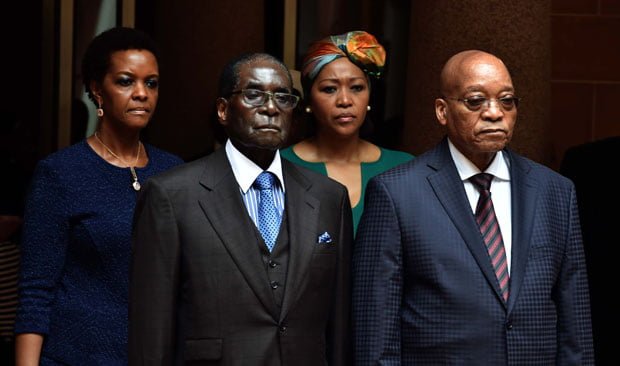 In South Africa, many years of rising class struggle have shattered the tripartite alliance (ANC-CPSA-COSATU). The strike movements and the movement of the youth in the universities led to the rise of the Economic Freedom Fighters and the new trade union federation led by NUMSA. Although the movement has temporarily subsided, the regime has been seriously affected by all these upheavals.
In South Africa, many years of rising class struggle have shattered the tripartite alliance (ANC-CPSA-COSATU). The strike movements and the movement of the youth in the universities led to the rise of the Economic Freedom Fighters and the new trade union federation led by NUMSA. Although the movement has temporarily subsided, the regime has been seriously affected by all these upheavals.
Economic crisis, mass anger, the open looting of state resources by the upstart black elite around Zuma and the Gupta family, is destabilising the situation and undermining the authority of the ANC. The big bourgeoisie, which collaborated with Mandela to stabilise the situation after the revolutionary events of the 1980s and 1990s, has come into conflict with the nouveau riche layer and the ruling clique around Zuma.
On the other hand, the ruling class cannot afford to discard the ANC because it does not have an alternative party to stabilise the situation. Aware of this, the Zuma wing has been recklessly raising the stakes in a dangerous game. This open split between the two camps and the potential split within the ANC could have revolutionary consequences for Africa’s most advanced economy.
In Nigeria, after the tremendous upsurge in class struggle in January 2012, the main pillar of bourgeois rule, the PDP, stood discredited in the eyes of the masses. That is why they hurriedly cobbled together a new party, the APC – in reality a fusion of smaller parties – and put at its head Buhari, whom they considered a good candidate to garner support among the mass of the population and cut across the growing radicalisation.
This manoeuvre was possible because the leaders of the NLC, the main trade union federation, instead of building on the 2012 movement, spent all their authority in reining in that movement, while at the same time refusing to promote an independent party of the working class. It is in this vacuum left by the labour leaders that Buhari could step in. But in spite of all this, none of the burning problems facing the Nigerian masses have been solved. This was recently expressed in the agitation for a Biafran Republic in the south east. Although crushed by the military, it reveals the underlying tensions in Nigerian society. And once the last remnants of illusions in Buhari finally dissipate, we will see a resurgence of the class struggle on an even bigger scale than in 2012.
In West and Central Africa, mass movements against the corrupt and exploitative local bourgeoisies in several countries have increased sharply over the past period. These were enormous movements that stretched over long periods of time and mobilised millions of peoples. The masses closely followed the heroic uprising in Burkina Faso, while the fragile economies of these countries are being hit particularly hard by the global economic crisis. The attacks by the weakening regimes on democratic rights, more recently in Togo and the DRC, served as the straw that broke the camel’s back. In particular, the mass of young people equate their general oppression with the decades old governments.
The widespread misery in the region, as well as the treacherous role of the bourgeois opposition leaders – whose sole interest is to replace the regime heads – confirm both the correctness of the theory of the permanent revolution and the need to build an international revolutionary organisation. Because of lack of a fighting leadership, after a huge upsurge of mass mobilisations, the movements receded. The only conclusion that the masses can draw from all this is that they can have no trust in the old leadership. Marxist theory and revolutionary organisation is what is required to break the logjam.
Pessimism of the bourgeois
 The hundredth anniversary of the October Revolution provided the strategists of Capital with an opportunity to reflect on history – and worry about the future. On August 15th, 2017 Martin Sandbu wrote in the Financial Times:
The hundredth anniversary of the October Revolution provided the strategists of Capital with an opportunity to reflect on history – and worry about the future. On August 15th, 2017 Martin Sandbu wrote in the Financial Times:
“Two anniversaries we mark this year – the centenary of the Russian Revolution and the decade since the start of the global financial crisis – have more in common than is apparent at first sight.
“The global financial crisis […] shook to its foundations the model that had emerged victorious from the cold war.
“The stultifying communism that the Soviet bloc had evolved to by the 1980s collapsed under the weight of its own economic and political contradictions. The political turmoil of the last year demonstrates that we are now watching to see whether open market economies will suffer the same fate.” (Our emphasis)
He continues:
“Friedrich von Hayek’s insight that flexible market prices contain more information than any planning mechanism can hope to gather centrally; and that dispersed decision-making therefore acts more efficiently than state authorities can do. […]
“Yet it had a rude awakening in the global financial crisis, which undermined any claim of western financial capitalism to being the best way to organise an economy.”
And he concludes:
“What happened 10 years ago this month was the horrifying realisation that financial claims accumulated over the previous boom years did not add up, that the future economic production which they were claims on was insufficient for them all to be honoured in full.
“[…] market liberalism, in its turn, betrayed the dream it had promised. Western economies are today far poorer than the trend before the crash predicted. The crisis and its aftermath have left the young, in particular, with little reason to hope for the same opportunities to prosper as their parents and grandparents.
“[…] a social system can survive disillusion for a long time. […] But when people can no longer count on their livelihoods, support snaps.”
Some of the more serious capitalist experts are beginning to understand that their recipes of the last 30 years are no longer working. In an article that appeared in the German paper Die Zeit under the title “Neoliberalism is dead” we are informed that even the IMF has admitted that their policies do not have the desired effect. But of course, they never draw all the necessary conclusions. [Source: Neoliberalism is dead, by Mark Schieritz, Die Zeit, June 2016)
Wolfgang Streek of the Max Planck Institute listed all the problems of capitalism in a long article published in New Left Review entitled, “How will capitalism end?” (May/June 2014), which in 2016 he expanded into a book. He says that there is a crisis of legitimacy of the capitalist system because it is no longer providing what it did in the past and people are therefore beginning to question the system. This explains the electoral volatility that can be observed in many countries. He also poses the question as to whether a “democratic system” can provide the policies that capitalism needs. What he means is whether they can impose on the working class what the bourgeois need.
In his article Streek states that capitalism “will for the foreseeable future hang in limbo, dead or about to die in an overdose of itself, but still very much around, as nobody has the power to move its decaying body out of the way”. This is not a bad description of the state of present-day capitalism.
It is significant that Martin Wolf, chief economics commentator of the Financial Times, felt the need to answer Streek in an article with the interesting title “The case against the collapse of capitalism.” (FT 2 November 2016). How well the strategists of capital understand the sickness of their own system!
Lenin explained that if it is not overthrown, the capitalist system will always recover from even the deepest crisis. Even in the 1930s there were periods of recovery. The bourgeois press has been talking about a recovery for the last seven years. In reality this is the weakest recovery in history and certain things flow from this.
Of course, the capitalist system still has important reserves and if the capitalists and bankers feel themselves threatened with losing everything, they will introduce Keynesian measures. But these reserves are not unlimited and they have been used up at an alarming rate in the last ten years. As a result, when the next crisis comes, as it inevitably will come, they will be in a far weaker position to mitigate its consequences than they were previously.
They constantly repeat that they have learned the lessons of 2008. But they also said they had learned the lessons of 1929. And as Hegel pointed out, anybody who studies history will have to conclude that nobody has ever learned anything from it.
In the final analysis, no matter what the bourgeois do, whether they adopt Keynesianism, monetarism, protections or anything else, they will be wrong. In the Middle Ages the priests used to say: all roads lead to Rome. Now we can use a slightly different variant: under capitalism, all roads lead to ruin.
Conclusions
 Not so long ago it seemed that nothing much was happening in the world. A discussion of world perspectives would have to concentrate on one or two countries. But now the same revolutionary process is taking place to a greater or lesser intensity in every single country of the world without exception. What we are therefore discussing is a general process of worldwide revolution.
Not so long ago it seemed that nothing much was happening in the world. A discussion of world perspectives would have to concentrate on one or two countries. But now the same revolutionary process is taking place to a greater or lesser intensity in every single country of the world without exception. What we are therefore discussing is a general process of worldwide revolution.
For Marxists, a discussion of economic perspectives is not an academic or abstract intellectual exercise. What is important is its effect for the class struggle and consciousness. But since consciousness always lags behind events, there was an inevitable delay between the beginning of the crisis and the intensification of the class struggle.
The bourgeoisie, always blindly empirical, were unable to see the explosive accumulation of subterranean discontent that was quietly gathering force. They were congratulating themselves that no revolution had taken place. Once they had recovered from the initial shock, for the bankers and capitalists it was “business as usual” Like a drunken man dancing on the edge of a precipice, they carried on with the merry carnival of money-making, which acquired an even more feverish pace while the conditions of the masses went from bad to worse.
Trotsky explained what he called the molecular process of revolution. In the History of the Russian Revolution he points out that, what determines the consciousness of the masses is not just the economic crisis, but rather the accumulation of discontent built up over the whole previous period. The discontent of the masses accumulates unnoticed until it finally reaches that critical point when quantity is transformed into quality.
Now, suddenly, the sense of relief of the ruling class has been replaced with pessimism and foreboding. There are social and political convulsions everywhere, accompanied by extreme instability on a world scale and violent alterations in world relations.
Even if the economy improves, it does not automatically register in the consciousness of the masses, which has been shaped by the memories of decades of stagnant or falling living standards. The very weak recovery in the USA signifies only a very relative improvement, confined to certain sectors. It does not affect the unemployed workers in the rustbelt. And everywhere else, it does not feel like a real recovery, and it has not restored any sense of confidence in the system or optimism in the future, but quite the opposite.
We see the same story reflected in the British referendum on EU membership. There are many reasons why the vote went in favour of Brexit. But a very important reason was revealed in the sharp regional differences between north and south. The bankers and speculators of the City of London did very well out of membership of the EU, which gave them privileged access to the lucrative financial markets of Europe. But membership has done nothing whatsoever for the poor areas of the north-east or Wales, which have suffered decades of deindustrialization, and the closure of the coal mines, steel plants and shipyards.
The growth of inequality
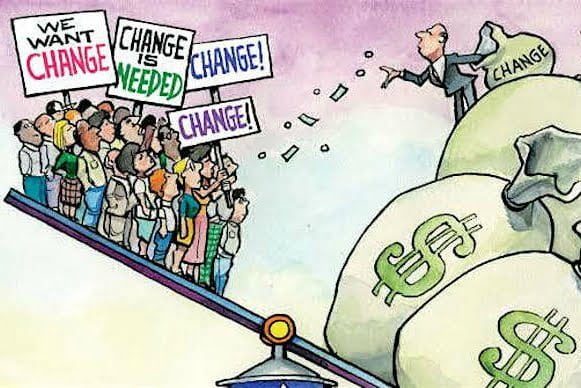 Everywhere there is a burning anger against grotesque levels of inequality, with obscene wealth of a tiny parasitic minority standing in sharp contrast to the growing poverty and despair at the bottom. The serious bourgeois are increasingly worried about this tendency because it is endangering the stability of the entire system. Everywhere there’s a burning hatred of the rich. Many people ask: if the economy is doing so well, why are our living standards not improving? Why are they still cutting welfare, health and education? Why do the rich not pay taxes? And to these questions they find no answers.
Everywhere there is a burning anger against grotesque levels of inequality, with obscene wealth of a tiny parasitic minority standing in sharp contrast to the growing poverty and despair at the bottom. The serious bourgeois are increasingly worried about this tendency because it is endangering the stability of the entire system. Everywhere there’s a burning hatred of the rich. Many people ask: if the economy is doing so well, why are our living standards not improving? Why are they still cutting welfare, health and education? Why do the rich not pay taxes? And to these questions they find no answers.
The bourgeois are getting increasingly alarmed about the political consequences of the crisis. Far from feeling the benefits of the so called recovery, most working class people are worse off than they were before the crash. The McKinsey Global Institute found that 65-70% of “income segments” in advanced economies experienced either stagnation or a fall in their income between 2005 and 2014. Countries like Italy saw all income segments affected. (Poorer Than Their Parents, McKinsey Global Institute)
In the wealthiest and most powerful capitalist country that has ever existed there has been no real increase in living standards for nearly forty years. Indeed, for most Americans living standards have been falling. And this is no exception. In all countries, the present young generation is the first since 1945 that cannot expect a better standard of living than their parents.
Polarisation of wealth in the US continues unabated. From 2000-2010 profits went up by 80% and wages by 8%, while average family incomes actually went down by 5%. These figures show that the massive increases in profit were achieved at the cost of the working class. (The Economist, What about the workers? May 25th 2011)
The figures for pre-tax and disposable income understate the case. They do not take into consideration other factors such as increasing working hours and increasing casualization, whether due to zero hour contracts or temporary employment, and cuts to welfare services. These all add to the total pressure on working class families.
The crisis has its most painful and direct effects on young people. For the first time in many decades the new generation will not have the same living standards as their parents. This has serious political consequences. In all countries, the intolerable pressure on the youth finds its expression in a sharp increase in political radicalisation. On all questions the youth stands much further to the left than the rest of society. They are far more open to revolutionary ideas than other layers and are therefore our natural constituency.
Lessons of the collapse of Stalinism
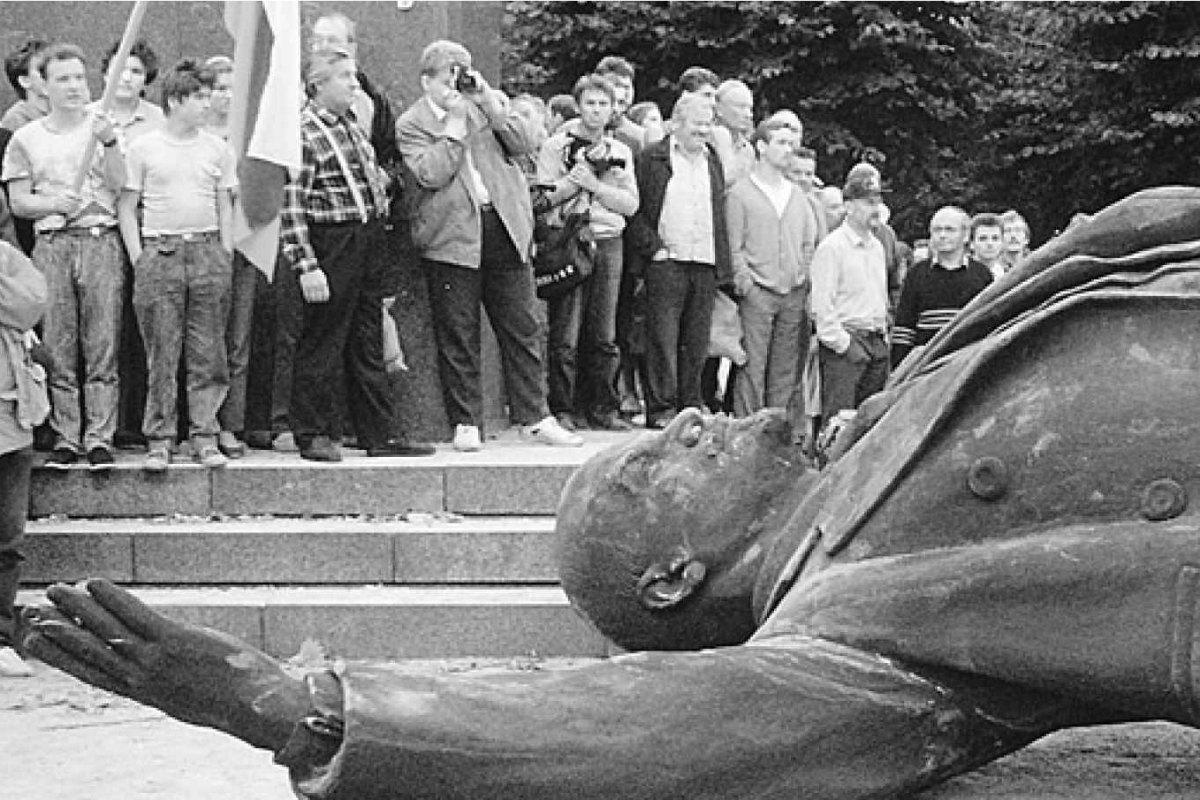 In 1991 the collapse of the Soviet Union changed the course of history. At that time, the bourgeoisie and its echoes in the Labour movement, the reformists, were euphoric. They talked about the end of socialism, the end of communism, and even the end of history.
In 1991 the collapse of the Soviet Union changed the course of history. At that time, the bourgeoisie and its echoes in the Labour movement, the reformists, were euphoric. They talked about the end of socialism, the end of communism, and even the end of history.
What Francis Fukuyama meant by his notorious aphorism was not that history as such had ended, but that the collapse of the Soviet Union meant that socialism was finished. It would therefore logically follow that the only system which could possibly exist was capitalism (the free market economy) and in that sense history had ended.
What was astonishing about the fall of Stalinism was the speed with which the apparently powerful and monolithic regimes collapsed once they were challenged by mass movements in Eastern Europe. That was a reflection of the internal rottenness and decay of the regime. But the decay of senile capitalism is increasingly becoming clear to millions of people.
When the Berlin Wall fell Ted Grant predicted that seen in retrospect the fall of Stalinism would only be the first act of a worldwide drama which would be followed by an even more dramatic second act – the global crisis of capitalism. We now see the truth of this statement. Instead of universal prosperity there is poverty, unemployment, hunger and misery. Instead of peace there is war after war after war.
The same processes that suddenly caused the downfall of Stalinism can occur in capitalism. In one country after another we are witnessing sudden shocks that are testing the resilience of the system and exposing its weaknesses.
The institutions of bourgeois democracy, which were previously trusted blindly, are beginning to be discredited everywhere. People do not trust the politicians, the government, the judges, the police, the security services, even the Church: the whole system is coming under intense scrutiny and criticism.
A representative of WikiLeaks was asked on British TV: “are you seriously suggesting that the intelligence services of the US are telling lies?” He replied, “why not? They always tell lies!” This is what many people are now beginning to believe.
The mass organisations: the crisis of reformism
 The crisis of capitalism is also the crisis of reformism. Everywhere the traditional parties of both the right and the left are in crises. Organizations that seemed to be solidly based and immutable are entering into crises, declining and even collapsing altogether. The reformist parties that have collaborated in governments that carried out deep cuts have been rejected by their traditional electorate.
The crisis of capitalism is also the crisis of reformism. Everywhere the traditional parties of both the right and the left are in crises. Organizations that seemed to be solidly based and immutable are entering into crises, declining and even collapsing altogether. The reformist parties that have collaborated in governments that carried out deep cuts have been rejected by their traditional electorate.
To one degree or another, and at one pace or another, the same processes can be seen in practically every country in Europe. As in France, so too in the Netherlands, where the right-wing party of Geert Wilders was defeated in the elections. The bourgeois breathed a sigh of relief. But far more significant than the defeat of Wilders was the crushing debacle of the Dutch Labour Party, which was practically wiped out. The party lost 75% of its support.
The rise of the Workers’ Party of Belgium is also a significant development. This ex-Maoist sect is now a left-reformist party, although it claims to be Marxist and Communist. In Wallonia, the French-speaking region, they are only just behind the Socialists. The same is true in Brussels. In the red belts they can get around 25% of the votes. But they are also beginning to grow in Flanders.
The masses are looking for and demanding a change. They need to find an organized political expression for this anger. Over the last period, the Greek masses have done everything in their power to fight to change society. There have been many mass strikes, general strikes and mass demonstrations. But here we come to the most important question: the subjective factor.
In their attempt to find a way out of the crisis, the masses turn first to one political option, they put it to the test, and then discard it and look for another. This explains the violent swings of public opinion to the left and the right. But they do not find what they are looking for. The people who ought to lead – the labour politicians, the social democrats, the so-called ex-communists, above all the trade union leaders – don’t want to fight against austerity and for a serious change in society.
Trotsky explained that betrayal is implicit in reformism. By this he did not mean that all reformists betray the working class deliberately. There can be honest reformists as well as the corrupt careerists and bureaucrats who are the agents of the bourgeoisie within the workers’ organizations. However, even honest left reformists have no perspective for a socialist transformation of society. They believe that it is possible to carry out the reforms that the workers require within the limits of capitalism. They regard themselves as supreme realists, but under conditions of capitalist crisis this “realism” stands exposed as the worst kind of utopianism.
The Pasok, which for decades was the mass party of the Greek working class, collapsed because of its betrayals and participation in governments of cuts. The workers turned to Syriza, which was previously a very small party. Alexis Tsipras became the most popular political leader in Greece. He held a referendum, asking “Should we accept the cuts of Frau Merkel?”, and there was a massive response.
The people of Greece voted overwhelmingly to reject austerity: not just the workers but also the middle classes, the taxi drivers and small businessmen. At that moment Tsipras could have said, “We are not going to pay one euro to these gangsters! Enough! We’ll take the power into our own hands and appeal to the workers of Spain, Italy, Germany and Britain to follow our example. We must fight against the dictatorship of the bankers and capitalists: for a genuinely democratic socialist Europe.”
Had he done that, he would have received overwhelming support. People would have been dancing in the streets. And the Greek people would have been prepared to make sacrifices, big sacrifices if necessary, to back their leaders – on one condition: that they were convinced that they were fighting for a just cause and the sacrifices would be the same for all. Tsipras could lifted his finger and it would have been the end of capitalism in Greece. He could have expropriated the bankers, the shipping magnates and industrialists.
But Tsipras is not a Marxist. He is a reformist and therefore it did not enter into his head to base himself on the power of the masses. He surrendered to the blackmail of Berlin and Brussels and he signed a far worse deal than the one originally proposed, leading to a colossal demoralization and big drop in support for Syriza, although he is still there because there is no alternative.
The process also affected Spain, which is passing through a profound political crisis. Like the rise of Syriza in Greece, the rapid rise of PODEMOS was a clear reflection of massive discontent with the old parties and a burning desire for change. But the confused and vacillating policies of the leadership caused disappointment among its followers even before they had come to power. Pablo Iglesias’ flirtation with Social Democracy led to a slump in the votes for Podemos and a sharp division among its leaders.
Now the leaders of Podemos are looking to their right – towards the PSOE, in the hope that some sort of deal can be struck to remove the hated Rajoy government. This has led them to a moderation of their language and they are under enormous pressure to appear more respectable and “statesman-like”. This will further confuse and disorient their supporters.
The new leader of the Socialists, Pedro Sanchez, is the palest of pale reflections of Jeremy Corbyn and Mélenchon. Nevertheless, for having dared to pose the question of a coalition government with Podemos and the Catalan nationalists, the Spanish ruling class attempted to remove him. This was rejected by the ranks in the internal elections, which returned Pedro Sanchez as general secretary.
The above-mentioned cases are different variants of the same process. Everywhere the reformist and ex-Stalinist parties are in crisis. Some have experienced splits, while others have disappeared altogether (Italy is an extreme example of this, where both the old socialist and communist parties have vanished). We have also seen the emergence of new political formations, such as Syriza and Podemos.
Like the foam on the waves of the sea, these new formations are a reflection of deep and powerful currents beneath the surface. However, these new formations lack a stable base in the working class and the trade unions. As a result of this, and also their mainly petty bourgeois composition, they are inherently unstable and may collapse as quickly as they arose.
The example of Corbyn in Britain is so far an exception to the rule. As we have explained, this development was the result of an accident, but as Hegel explained, an accident that revealed a necessity. The strong side of the Corbyn movement is that it has provided the necessary focal point for the accumulated discontent of the masses, especially the youth. Its weak side will be revealed when the limited nature of the left reformist programme is put to the test in a Left Labour government.
This means that our tactics have to be flexible at all times, attuned to the concrete conditions and the level of consciousness of the working class and above all its most active and advanced layers. In all of these cases our approach must always be the same: critical support.
We will support the left reformists in the fight against the right wing, always pushing them to go further. But at the same time we must patiently explain to the advanced workers and youth the limitations of a programme that does not aim to overthrow capitalism but seeks only to reform it from within – a utopian policy which, irrespective of the good intentions of its advocates, under the conditions of capitalist crisis, can only lead to defeat and prepare the way for a swing to the right.
Radicalisation of the youth
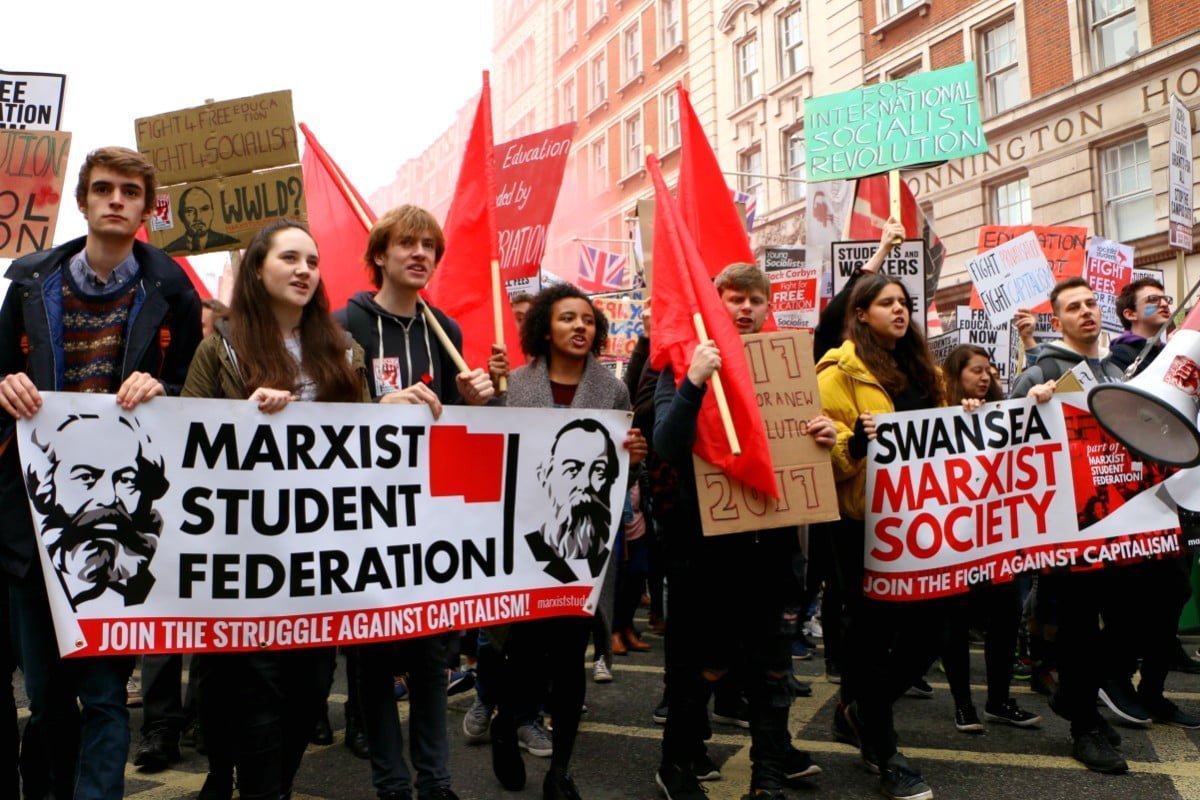 Political and social instability are sweeping like a hot wind from one European country to another. The changing consciousness was reflected in an opinion poll for the youth published in Quartz, April 28, 2017. It was part of a European Union-sponsored survey, titled “Generation what?” Around 580,000 respondents in 35 countries were asked the question: “Would you actively participate in large-scale uprising against the generation in power if it happened in the next days or months?” More than half of 18- to 34-year-olds said yes. The article concludes: “Young Europeans are sick of the status quo in Europe. And they’re ready to take to the streets to bring about change.”
Political and social instability are sweeping like a hot wind from one European country to another. The changing consciousness was reflected in an opinion poll for the youth published in Quartz, April 28, 2017. It was part of a European Union-sponsored survey, titled “Generation what?” Around 580,000 respondents in 35 countries were asked the question: “Would you actively participate in large-scale uprising against the generation in power if it happened in the next days or months?” More than half of 18- to 34-year-olds said yes. The article concludes: “Young Europeans are sick of the status quo in Europe. And they’re ready to take to the streets to bring about change.”
The report went on to focus on respondents from 13 countries to better understand what young people are optimistic and frustrated about in Europe. Among these countries, young people in Greece were “particularly interested in joining a large-scale uprising against their government, with 67% answering yes to the question.” Respondents in Greece were also more likely to believe politicians were corrupt and to have negative perceptions of the country’s financial sector.
Young people in Italy and Spain were next, with 65% and 63% willing to join a large-scale uprising, respectively. In France, a country that has revolution written into its DNA, 61% of the youth answered yes. But even in in the Netherlands, which has so far escaped the worst of the crisis, a third of young people agreed with the statement, rising to 37% in Germany and almost 40% in Austria.
During the election campaign, French teenagers held rallies in Rennes and other cities to protest against both presidential candidates. Some protesters blockaded schools, while others marched towards the city centre with placards that read “Expel Marine Le Pen, not immigrants” and “We don’t want Macron or Le Pen.” The report notes that respondents from France complained of a number of negative developments—too much corruption, too many taxes, too many rich people—compared to the rest in the EU.
These figures indicate that a profound change is taking place. The report concludes: “Voter apathy among the young has long been described as a worrying trend. In the UK, for example, youth turnout rates at general elections fell by 28 percentage points, from 66% in 1992 to 38% in 2005. But this declining electoral participation is not necessarily evidence of political apathy.”
The problem of leadership
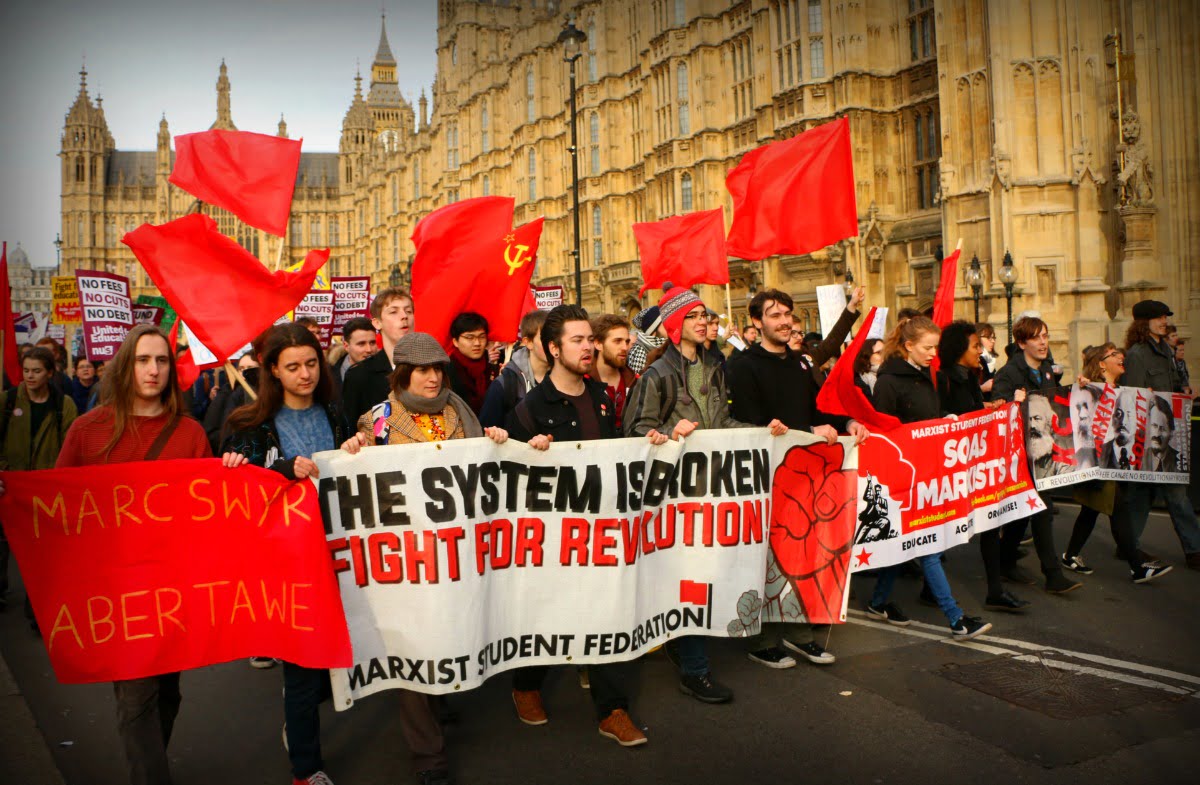 Some superficial people have asked: “if things are so bad, why has there not been a revolution?” The ruling class was congratulating itself that this has not happened, since they initially feared the worst. And since the worst did not immediately materialise they breathed a sigh of relief and returned to the merry carnival of money-making, while everybody else has seen their living standards and future prospects crushed. In other words they behave like a man who is sawing off the branch he is sitting on.
Some superficial people have asked: “if things are so bad, why has there not been a revolution?” The ruling class was congratulating itself that this has not happened, since they initially feared the worst. And since the worst did not immediately materialise they breathed a sigh of relief and returned to the merry carnival of money-making, while everybody else has seen their living standards and future prospects crushed. In other words they behave like a man who is sawing off the branch he is sitting on.
In reality there is nothing surprising about the delay in the process of revolution. Over many decades the bankers and capitalists have built powerful defences for their system. They control the press, radio and television. They enjoy virtually limitless financial resources, which they use to buy the services of political parties – not only of the right but of the ‘Left’, and also of many ‘responsible’ trade union leaders. They can count on the support of university professors, lawyers, economists, bishops and the most privileged upper layers of the intelligentsia. And if all this fails, they can always resort to the policeman’s truncheon, the judges and the prison system.
But there is another, far more powerful barrier to revolution. Human consciousness, contrary to what the idealists think, is not progressive and certainly not revolutionary. It is innately and profoundly conservative. Most people are scared of change. Under normal conditions they will cling to the familiar, to what they know: familiar ideas, parties, leaders, religions. This is quite natural and reflects an instinct for self-preservation. It goes back into the days when we lived in caves and feared the dark recesses where dangerous animals lurked.
There is something comforting in routine, habit and tradition, in treading the old, well-known paths. As a rule, people will only accept the idea of change on the basis of great events that shake society to its foundations, transforming consciousness and forcing people to see things as they really are. This does not occur gradually, but in an explosive way. And that is precisely what we see now taking place everywhere. Consciousness is beginning to catch up with a bang.
The most important question is the question of leadership. In 1914 the German army officers described the British army in France with the following phrase: “Lions led by donkeys.” And that’s a very good description of the working class everywhere. The reformist leaders play a most pernicious role, clinging to the “free market” even when it is collapsing all around them.
The right-wing reformist leaders are completely corrupt. They abandoned all pretence to stand for socialism decades ago and become the most faithful servants of the bankers and capitalists. They willingly take upon their shoulders the responsibility for cuts in welfare spending and attacks on living standards in order to defend capitalism. But in so doing they discredit themselves in the eyes of the masses who earlier supported them.
There was a clear logic in this. In a period of capitalist upswing it was possible to make concessions to the working class, especially in the advanced capitalist countries of North America, Europe and Japan. But in a period of deep crisis the bourgeois say they can no longer afford reforms. On the contrary, they demand the liquidation of those reforms that were won since 1945. For the masses, reformism with reforms makes sense. But reformism without reforms, or rather, reformism with counter-reforms, makes no sense at all.
The long period of capitalist upswing that followed the end of the Second World War set the final seal on the degeneration of the Social Democracy. This degeneration has penetrated deep into its ranks. Most of the older activists in the Social Democratic parties and the trade unions have been demoralised by the previous period. They are disillusioned, disoriented and profoundly sceptical. They are completely out of touch with the real mood and they do not reflect the class.
This layer of activists never understood anything. They do not represent the present or the future but are only a reflection of the demoralization of past defeats. The situation is even worse with the ex-Stalinists, who have completely abandoned any socialist perspective or revolutionary class instinct they may once have possessed. Some of them may come back into activity when the class struggle rises. But mostly these and left-reformists and ex-Stalinists are so deeply impregnated with the spirit of scepticism that they are an obstacle in the path of the militant workers and the youth who are seeking the road of socialist revolution.
Our position as a revolutionary organisation cannot be determined or influenced in any way by the prejudices of this layer. Our tactics are based on the real situation: the organic crisis of capitalism, which in turn is producing a new generation of class fighters, which will be far more revolutionary than the older generation ever was. We must base ourselves on the youth: both the students and school students and above all the working class youth who are cruelly exploited and are wide open to revolutionary ideas.
This is a period of sudden shocks and changes in the situation, which affect all countries without exception. The political centre is collapsing everywhere and this is a reflection of growing class polarisation. Where there was previously political stability, there is growing instability. Elections lead to one shock after another: sharp swings to the right and left. Things that were not supposed to happen are now happening. Therefore, we must be prepared for big changes, which can happen quicker than we think. If the left disappoints the aspirations of the masses, there can be a move to the right, which in turn prepares bigger swings to the left.
We must follow the process as it unfolds. We must arm ourselves with revolutionary patience, since it is impossible to impose our own timetable upon events that must follow their own course according to their own speed. But we must also be prepared for sharp and sudden changes, which are implicit in the whole situation. Colossal events can come upon us far sooner than what we think. There is no room for complacency.
We must build the forces of the IMT as quickly as possible. We must have a sense of urgency. We are on the right road. We must prove ourselves in action and in practice to be the true and worthy inheritors of the traditions of 1917, of Lenin and Trotsky, and the Bolshevik revolution.
We must have absolute confidence in our class, the working class, the only creative class, the class that creates all the wealth in society, and the only truly revolutionary class that holds the fate of humanity in its hands. We must have total confidence in the ideas of Marxism and, last but not least, we must have confidence in ourselves: absolute confidence that, armed with the ideas of Marxism, we will build the forces that are necessary to lead the struggle to change society, to put an end to this regime of cruelty, injustice, exploitation and slavery, and bring about the victory of socialism throughout the world.

